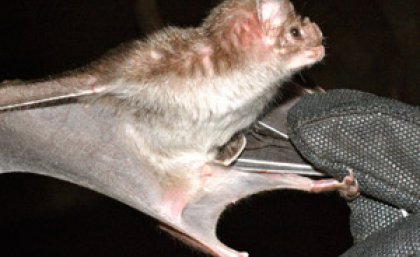
Vampire bat venom could hold the key to new treatments for stroke and high blood pressure.
An international team of scientists led by UQ’s Associate Professor Bryan Fry from the School of Biological Sciences has discovered that vampire bat venom contains molecules capable of evading the victim’s immune system.
“Our team’s results point to entirely new forms of anticoagulants in the venom, as well as novel molecules that cause dilation of the small arteries near the skin,” Associate Professor Fry said.
“Just as snake venom has developed rapidly to stay ahead of evolving resistance in prey, vampire bats are rapidly evolving their venom to prevent the immune system of the prey from generating antibodies against the venom molecules.”
Associate Professor Fry said vampire bats secreted multiple forms of the same active components, with myriad tiny changes scattered across the surface of the molecule.
“This means that even if an antibody is generated against one molecule, there are a number of other ones that will sneak past the prey’s defence system and keep the blood flowing.
“This means the same victim can be fed on night after night.
“The discovery reveals a vast array of novel molecules, which have tremendous potential to yield new treatments for stroke and high blood pressure.”
The study’s findings are published in the Journal of Proteomics.
Media: Associate Professor Bryan Fry (bgfry@uq.edu.au or 0400 193 182) or School of Biological Sciences Communications Manager Tracey Franchi (t.franchi@uq.edu.au or 3365 4831).
About the School of Biological Sciences
Through research undertaken in the School, UQ has been ranked by the 2012 National Taiwan University Rankings in the top five universities globally for research in ecology and environmental biology and in the top 18 universities globally for plant and animal biology. The UQ School of Biological Sciences attracts researchers of world standing in a range of disciplines, with international leaders in many diverse fields. Our work spans the scales of biological organisation, from molecules and cells to organisms, populations, species and communities. With more than 150 researchers working in evolution, global change biology, ecology, aquaculture, animal behaviour, physiology, entomology, zoology, botany, genomics, development and conservation biology, our researchers and graduate scientists are well-equipped to make a real difference in contributing to solving global problems.
.jpg)



